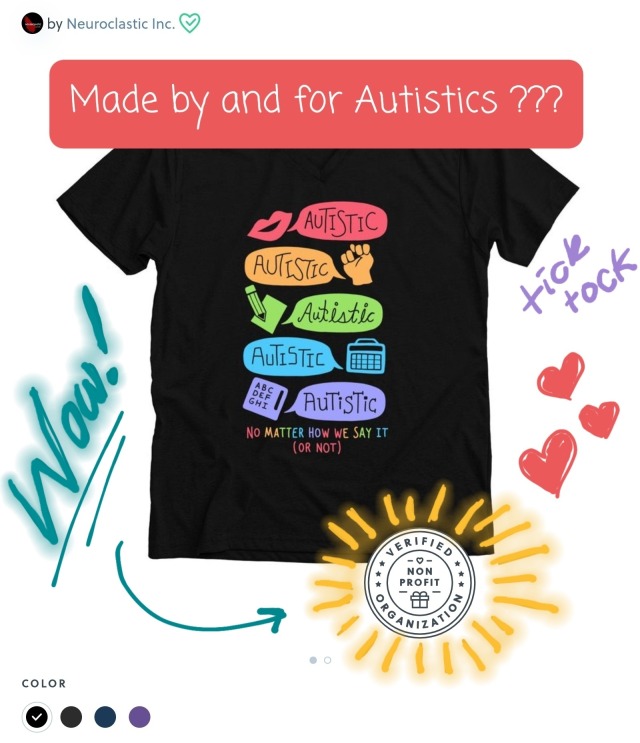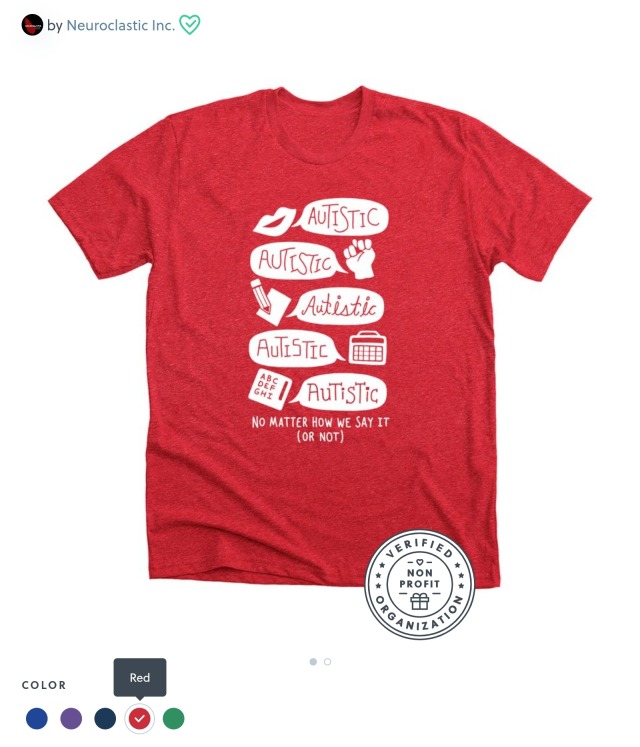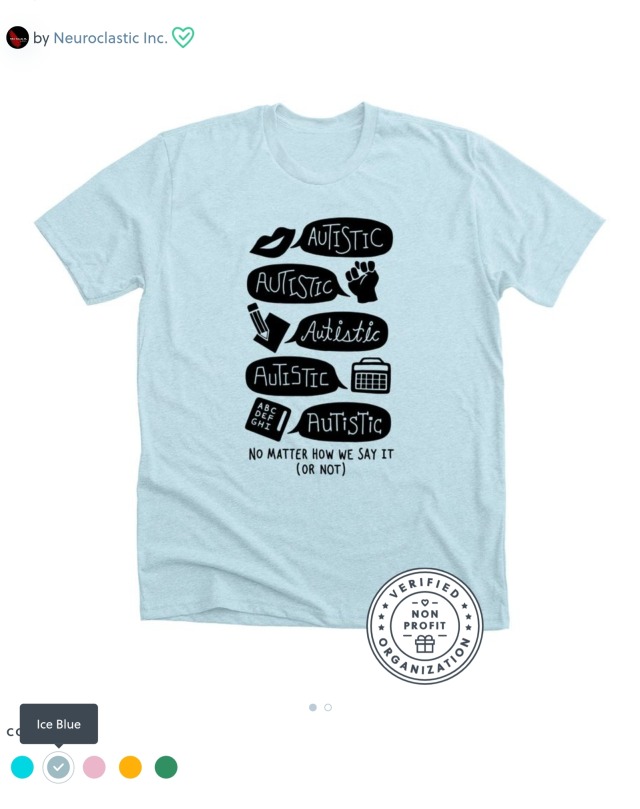#nonspeaking
Charity T-Shirt Drive!




[Images descriptions in alt text]
Hey! this is my art but 100% of the proceeds go to @neuroclastic ! - an autistic led organization that promotes neurodiversity!
Their Bonfire store has my design in full color and color-sensitive options in a variety of tops - but Bonfire doesn’t keep campaigns up forever so these are literally only available for a ‘limited time’… ⏳
Go check them out, or share around!♾
Allies are welcome!
Autism and Selective Mutism: what’s the overlap and what are the differences?
There are a lot of autistic people who have been diagnosed and/or treated for Selective Mutism, even though currently under the DSM-5 the two conditions cannot be diagnosed in the same person. The ICD-10 may have a different classification system, though I’m not entirely sure. Also, while many feel that the name Selective Mutism is inaccurate (and many prefer the term Situational Mutism), since that is the official diagnostic term it is what I will be using here.
Many (if not most) autistic people experience loss of speech in certain situations or for certain periods of time. But what’s the difference between nonverbal episodes, which are common in autistic people, and Selective Mutism?
To know that, we have to know the characteristics of each situation:
Selective Mutism (SM) is an anxiety disorder that results in an inability to speak in certain social situations, or to certain people in specific circumstances, in people who are otherwise capable of producing speech. Common places that people with SM lose the ability to speak are at school, at parks, at parties, etc. Almost all people with SM also have Social Anxiety Disorder. One common fear that results in an inability to speak in peoplr with SM is fear of judgement. People with SM aren’t just “choosing not to speak.” Their ability to speak gets completely shut off by social anxiety, and it’s not something they can control. SM is most frequently diagnosed in children and teenagers, but adults can have it too.
Autistic people, on the other hand, often lose the ability to speak when we are overstimulated by any variety of stimuli, or when we enter shutdowns, meltdowns, and burnout. Anxiety can be one emotion or circumstance that results in us entering a shutdown/meltdown state, or even burnout. This may be why it’s often very difficult to tease apart autism from SM. Whereas anxiety is the core cause of SM, the reasons that autistic people lose speech are often a lot more complicated and varied.
Here’s an incomplete list of reasons or circumstances that might cause an autistic person who is normally capable of speaking to lose speech:
- Overstimulation from external sensory stimuli like noises, lights, and motion
- Extreme emotions like frustration or sadness
- Anxiety (because of social circumstances or for other reasons)
- Overstimulation from internal sensory stimuli like pain, hunger, or nausea
- Being in an unpredictable and/or chaotic situation, which may provoke sensory overload and anxiety
All of the things I listed above can also cause meltdowns and shutdowns, which are the most common scenarios where autistic people lose speech. However, sometimes autistic people lose the ability to speak for no apparent reason at all. We might feel perfectly fine otherwise, and yet be unable to talk. One possible explanation for this is that sometimes autistic people’s brains shut off the ability to speak in order to conserve energy, because it requires a lot of effort to coordinate all of the motor movements required to vocally articulate words.
Given this, an autistic person losing speech might appear very similar to someone with SM on the surface, but the cause of the mutism itself is quite different. Autistic people might lose speech at school, in public, at amusement parks, at dances, at parties, etc. not always because we’re anxious per se, but because we’re overstimulated by everything in our environment. The overstimulation can cause feelings of anxiety and even panic, but this anxiety is often secondary to the primary experience of overstimulation.
Now, there are probably a decent number of autistic people who also have true SM, which is a social anxiety disorder. But it’s also probably the case for many autistic people diagnosed with SM, that the cause of their mutism isn’t necessarily the same as it is for other people who carry the same diagnosis.
Greta Thunberg has been very open about her diagnosis of SM, and her experiences with losing speech. She has discussed the few years where she stopped eating and stopped talking, which to me seems like it very well could have been a period of autistic burnout. She has also talked about her experiences with overstimulation, and how when she gets too overwhelmed by sensory stimuli she enters a shutdown state and loses the ability to speak.
To me, it seems that Greta’s SM is very intimately connected with her autism, which is likely true of anyone with both diagnoses, and especially true for autistic people who also have Social Anxiety Disorder. Autistic people already have difficulty with socializing, processing information, and coordinating the movements required for speech. Add on anxiety and fear of judgement as a result of bullying and mistreatment, and it’s almost inevitable that we’ll end up having trouble speaking in certain circumstances.
Ultimately, I’m not sure whether or not it’s appropriate for autistic people to be diagnosed with Selective Mutism. The DSM-5 seems to think that it makes more sense to keep the diagnoses separate, because autistic people’s unique struggles with speech shouldn’t be confused with a very specific anxiety disorder that frequently affects non-autistic and non-neurodivergent people.
If that’s the case, I think the autistic community should start brainstorming words and terms to describe our unique experiences with losing speech, that aren’t tied up with Selective Mutism but that respect the lived experiences of nonspeaking autistics. I think “nonverbal episode” is an adequate working term, but I know that many nonspeaking autistic people have expressed that the use of the words “nonspeaking” and “nonverbal” by autistic people who usually can speak, diminishes the lived experiences of autistic people who are fully unable to speak under any circumstances.
What I’ve seen is that generally, the word “nonspeaking” or “nonverbal” is used to refer to autistic people who are completely unable to speak due to significant motor skills differences, but when those words are attached to the word “episode” they refer to a specific period of time or circumstance in which an autistic person who is usually capable of speaking becomes unable to speak. I wish there was a word to describe just that second experience, without using the words “nonspeaking” or “nonverbal.” If anyone has any ideas, let me know in the comments.
I hope this post has provided some clarity on the overlap and differences between autism and Selective Mutism :)
~Eden
